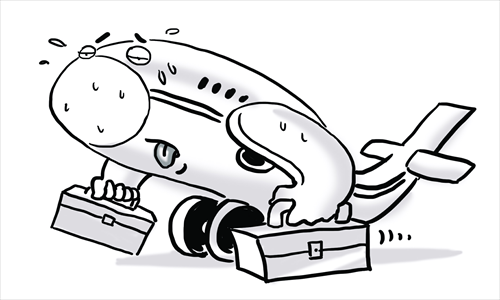Flight delays make mockery of ‘China speed’

China is moving fast. Its GDP growth topped 7.5 percent in the worst years of the global economic decline. It was also able, when the world economy began to recover in 2012, to surpass the US in total volume of trade.
China's image seems to have become synonymous with speed. But a report released recently by FlightStats, a reliable US-based real-time tracker of world air travel services, ranked Chinese mainland's airports as the world's worst in terms of on-time departures and arrivals.
According to the report, which covers 35 major world airports and their punctuality this June, Beijing Capital International Airport is embarrassingly listed at the bottom, with just 18.3 percent of flights leaving on time.
The second worst was taken by another Chinese airport - Shanghai Hongqiao International Airport, with only 28.72 percent of its passenger planes taking off on schedule. The average punctuality rate was 69.26 percent.
Zou Jianjun, an associate professor at the Civil Aviation Management Institute of China, has expressed his doubts about this report, saying the standards for evaluating on-time performances are not unified worldwide.
China's civil aviation administration has also released its own statistics for Chinese airports, showing that the average punctuality rate in 2012 was only 74.83 percent, the lowest in the last five years.
But these explanations can barely remove the label of "delay" attached to Chinese airlines.
In a decade, both Beijing and Shanghai have made it onto the world's top 20 airports measured by passenger traffic - Beijing even ranks second. Nonetheless, though "China's speed" seems to dazzle, "China's quality" cripples.
Chinese air travel has boomed due to rising incomes and cheaper tickets. But along with this growth come frequent delays and rude behavior from passengers, fuelling tensions and resulting in more incidents of air rage.
This negative portrayal of China's aviation sector leaves the administration no option but to do something.
Li Jiaxiang, head of the Civil Aviation Administration of China, is said to be launching a special campaign to rectify flight delays in the second half of this year.
It is reported that the campaign covers more specific regulations to standardize airline services, especially punitive measures to avoid flight delays.
However, such a campaign is more like a responsibility-shifting plan rather than a solution to the real problems. It mainly focuses on a heavier punishment for flight delays, such as canceling the airline's qualification to continue operating, and forbidding it from applying for the same one in the next season if so-called mass incidents are caused by flight delays they are responsible for.
Too many penalties, which are sometimes ambiguous and lack effectiveness, can only suppress the initiative of airlines.
Resolving flight delays is not an open-and-shut job. Besides factors beyond anyone's control, including extreme weather conditions, the human factor is the crux.
Civilian airlines use only 20 percent of the airspace in China, while the rest is strictly controlled by the military.
Other than that, abrupt air traffic controls, poorly conceived airline services, heavily burdened airports and ill-mannered passengers all contribute to the deterioration of this problem.
What really matters is how to ease the bottleneck caused by the surging demand for air travel and the lagging supply of airspace, traffic flow and qualified services.
There should be a systematic and progressive program, requiring the authorities, airlines, passengers and the government to take their own responsibilities and strike a balance in terms of distribution of benefits.
On the one hand, as for the authorities and the government, they need to become both a supervisor and a problem-solver for airlines instead of acting as a sole leader.
They should consider how to expand civilian airspace and optimize the current platforms, mechanisms and regulations to ensure the efficiency of every single flight.
On the other hand, as for the airlines and passengers, mutual understanding and respect will address most problems.
Airlines need to provide reasonable and instant compensation to passengers when their flights are delayed, while the passengers have to learn how to behave in a civilized way.
Only by doing so can Chinese flights and airports be praised for their state-of-the-art quality, rather than their scale and speed.
The author is a Global Times reporter. liuzhun@globaltimes.com.cn